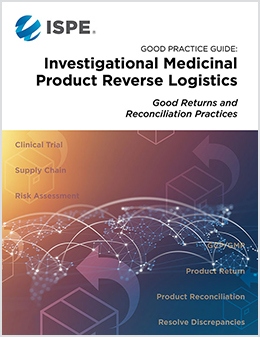Good Practice Guide: IMP Reverse Logistics

Published: August 2021
Pages: 56
Every year the number of clinical trials conducted across the globe rises in a concerted effort to develop new or improved medicinal products that ultimately improve lives. The pharmaceutical industry has developed standards and best practices in almost every aspect of a trial. There is, however, one area that lacks foundational best practices: that of medicinal product accountability, reconciliation, and return for destruction, otherwise known as reverse logistics.
Most current reverse logistics processes lack effective planning, thorough application of risk management, and well-defined roles and responsibilities. This results in inefficient and costly processes that often cause delays in study closure as failure to account for study materials can affect the acceptability of trial data. Establishing better standards is also complicated by gaps in and lack of harmonization between Good Clinical Practice (GCP), Good Manufacturing Practice (GMP), local environmental laws and regulations, and import/export and customs regulations.
The first such guidance in the pharmaceutical industry, this ISPE Good Practice Guide: Investigational Medicinal Product Reverse Logistics – Good Returns and Reconciliation Practices describes steps that can be taken to plan for and implement a successful reverse logistics process within any investigational product supply chain. It provides a clear outline of the aspects to consider to effectively manage investigational product returns. Written by top experts in the field, the Guide discusses the key requirements of a good reverse logistics process and common pitfalls to avoid.
Topics covered include regulations, product characteristics, trial conduct considerations, logistics, and the use of technology, highlighting what has been successful in the industry. Additionally, a timeline of activities is presented as an example checklist of best practices.
The Guide promotes the development of a company policy applicable to all clinical trials. This policy should determine which Quality Assurance organization, GCP or GMP, governs which process. Deciding this can be especially challenging when an audit or inspection finding is noted, or when deviations are evaluated, as practices in each Quality group may be different. A good policy directs which Quality area has jurisdiction, so it clear which standard operating procedures are to be followed.
Emphasizing planning for issues before the study starts, the Guide offers suggestions for situations such as what to do if importing a drug for destruction is not possible, or if there are changes in site capabilities during the trial. Additionally, scenarios are given in the Guide to help organizations prepare for potential issues. For example, if the investigational medicine is a controlled substance and the patient reports losing a pill down the sink, how will discrepancies like this be treated?
The ISPE Good Practice Guide: Investigational Medicinal Product Reverse Logistics – Good Returns and Reconciliation Practices is the first collection of best practices in the area of Investigational Product Management. It uses the general assumption of working with solid-dosage forms, as they form the majority of experience in the industry; however, alternative dosage forms and their special considerations are addressed. This Guide will help organizations effectively plan and implement reverse logistics policies and processes within their investigational product supply chain organization.






